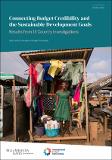Connecting Budget Credibility and the Sustainable Development Goals : Results from 13 Country Investigations

View/
Date
2022-10-30Author
Jesuit Centre for Theological Reflection
Type
Case StudyLanguage
enItem Usage Stats
62
views
views
23
downloads
downloads
Abstract
Budget credibility is a challenge found in many developing countries. It is defined as the difference
between the budget that is approved by a country’s legislature, the actual expenditures spent, and
revenues collected during a fiscal year. Budget credibility is a measure of whether governments can meet
the fiscal targets set out in their budgets. In practice, governments can often deviate from their budget
targets at both the aggregate level of total revenues and expenditures, as well as in shifts in spending at a
compositional level, for example, spending more or less than planned in different ministries and sectors.
In certain cases, shifts during the year away from planned budgets are necessary, planned, and reviewed
or approved by legislatures. Supplementary budgets, often used by governments to adjust resources in
times of crisis, were a widespread practice during COVID and helped countries respond to the crisis and
lessen its economic impact.
Description
The importance of effective implementation of government budgets has been recognized within the SDG
indicators by the inclusion of a specific indicator on budget credibility within Goal 16 on Peace, Justice,
and Effective Institutions. SDG indicator 16.6.1. measures “primary government expenditures as a
proportion of original approved budget, by sector (or by budget codes or similar),” derived from the Public
Expenditure and Financial Accountability (PEFA) assessment framework. The PEFA Secretariat collects
and reports data on SDG indicator 16.6.1 based on country PEFA reports and data from World Bank
economists. As of August 2022, data for 150 countries for an average of 10 years had been published on
the World Bank Data Portal, and the United Nations Statistics Division’s Global SDGs Database.